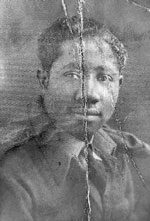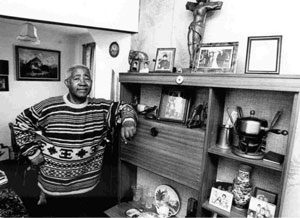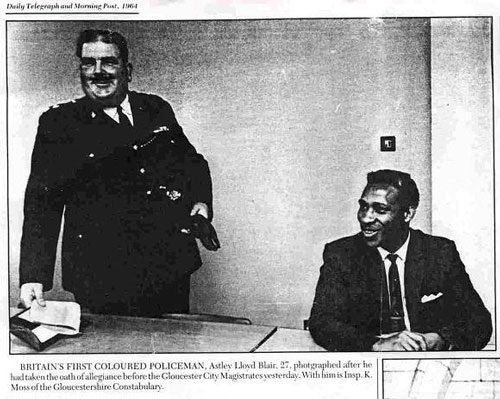Black history is an important part of Gloucestershire’s past and present, and the below stories showcase the lives, experiences and history of the Black people of Gloucester.
Here at Gloucester City Homes, we strive to give a voice to our community and celebrate the diverse histories of our county. Email communications@gch.co.uk if you have a story to share!



In the case of Histon (Stan) Boreland, there was no return to Gayle, in the parish of St. Mary, Jamaica. Following his stint as a motorcyclist with the RAF during the war, he stayed on.
It was in 1944, as a young man aged 18, that he had seen advertisements in the ‘Jamaican Gleaner’ stating that “The Mother Country Needs You”, encouraging people to join in the war effort. He responded to an advertisement for ground staff for the RAF.
His journey to England was not straightforward. He travelled on the SS Cuba, leaving Jamaica on 16th May. However, after just four days, the ship had to dock at Newport News, Virginia, U.S.A. The men were required to stay a few days at Camp Patrick Henry as the ship could not be escorted across the Atlantic due to D-Day arrangements.
After a train journey to New York, he boarded the SS Arawa in a convoy of 75 ships including tankers from South America, destroyers and other boats. About halfway across the Atlantic, a German submarine was sighted and the convoy had to disperse. He eventually arrived at Liverpool docks on 27th June.
Stan completed eight weeks of basic training or “square-bashing” in Yorkshire – at a Butlin’s camp which had been requisitioned by the army – followed by a motorcycle course at Weeton, near Blackpool. He was then posted to Little Staughton, to Number 8 Bomber Group (“Pathfinders”), as a motorcyclist travelling to various sister units, until the end of the war.
Following short spells in Suffolk and Cornwall, Stan came to Gloucester in October 1946. He was posted to RAF Innsworth, where he remained until 1949. He recalls that there were between forty and fifty servicemen from the Caribbean in Gloucester at the time. In his last year at Innsworth, he met his wife, Vilma, at a camp dance at Churchdown.
That same year, due to a dock strike and the employment of servicemen to carry out the work, he was posted to York, but later returned to Gloucestershire, to South Cerney. Here he was based until he left the air force in January 1952. When he was demobbed, he lived for a while with his in-laws. As an ex-serviceman, he had no problems finding accommodation and was given a council house in Matson.
In civilian life, Stan was employed as a driver for many years. He then completed a government training course as a welder and was employed at the Wagon Works in Southgate Street until it closed down.
Story courtesy of GloucesterFM: https://www.gloucesterfm.com/black-history/black-history-profiles-Histon-Stan-Boreland.html

Astley Lloyd Blair became England’s first Black policeman in 1964 when he joined the Gloucestershire police force.
An article from the Daily Telegraph and Morning Post in 1964. Astley Lloyd Blair, aged 27, was Britain’s first black policeman. The picture shows him after taking his oath of allegiance at Gloucester City Magistrates Court.
Story courtesy of GloucesterFM: https://www.gloucesterfm.com/black-history/black-history-profiles-1st-policeman.html



The Empire Windrush’s voyage from the Caribbean to Tilbury took place in 1948. Believe it or not, very few of the migrants intended to stay in Britain for more than a few years.
If it hadn’t been for the Second World War, the Windrush and her passengers might not have made the voyage at all. During the war, thousands of Caribbean men and women had been recruited to serve in the armed forces.
When the Windrush stopped in Jamaica to pick up servicemen who were on leave from their units, many of their former comrades decided to make the trip in order to rejoin the RAF. More adventurous spirits, mostly young men, who had heard about the voyage and simply fancied coming to see England, ‘the mother country’, doubled their numbers.
June 22nd 1948, the day that the Windrush discharged its passengers at Tilbury, has become an important landmark in the history of modern Britain; and the image of the Caribbeans filing off its gangplank has come to symbolise many of the changes which have taken place here. Caribbean migrants have become a vital part of British society and, in the process, transformed important aspects of British life.
Story courtesy of GloucesterFM: https://www.gloucesterfm.com/black-history/black-history-profiles-The-Empire-Windrush.html

Beresford Nasralla left his home in Kingston, Jamaica and arrived at Tilbury Dock, London on 22 June 1948, after a month at sea. He was a passenger on the “Empire Windrush”. At the age of 24, he had travelled to Britain with his friend, Kelvin, “to seek employment and see the other side of the world”. He recalls there were troops from the Glorious Glosters on board who were returning to their homeland.
He was to have travelled with his friend to Nottingham, where his friend’s brother lived. However, he and his friend were separated upon disembarking, and he found himself all alone. He went to Nottingham and lodged with “a kind English couple” for a week, but then left for Kent. Police in Kent directed him to Clapham South deep air raid shelter, where 236 of those who had arrived on 22 June had been housed before dispersal across the land to areas able to provide them with employment.


Beresford “came to Gloucester with fifteen others, We all obtained accommodation at Brockworth hostel, where we were issued with ration books. I was able to obtain employment with British Rail”. He retired from British Rail in 1988.
Beresford met his wife, Gloria, in 1954, at a house party in Lower Barton Street, where he and many other Jamaicans were living. She had left her home in Mount Regale in St. Mary, Jamaica, to travel to England on board the “Jamaica Producer”, travelling first class for a fare of £99. She had been encouraged by her mother to train as a nurse and had written to an uncle who lived in London, asking him to find the address of the Gloucester Infirmary. Being an only child and having lived a “sheltered life”, she did not want the bright lights of a big city. She had chosen Gloucester as her destination quite simply because it was a city she had come across when looking through her old geography books and maps of England.
She did not come directly to Gloucester, but stayed with her uncle in London and missed a term at the hospital, while working in a factory, stitching straps on petticoats. It was the year of the coronation of Queen Elizabeth, and the activities and preparations that were taking place fascinated her.
“When I first came to Gloucester, there were only three other West Indian girls here – two Jamaican student nurses, Dorret Hall and Pearl Harvey, and a Jamaican woman called Mrs Golding who lived with her husband in accommodation at a hostel in Brockworth”. The Goldings were very kind to the young nurses and occasionally invited them for a meal. They were not allowed to cook meals at the nurse’s home and missed home cooking. Life at the nurse’s home was very strict. No visitors were allowed.
After a “whirlwind romance”, she married Beresford on 10 July 1954. They held the reception at their newly purchased home, at 3 Regent Street.
Gloria enjoyed a long and distinguished career in nursing. She qualified as an SRN in 1958 and went on to do her midwifery training at St. Paul’s, Cheltenham. There followed many promotions; staff nurse, night sister, ward sister, nursing officer, senior nurse manager, specialist nurse and senior nurse giving support and advice. She retired in December 1992.
Story courtesy of GloucesterFM: https://www.gloucesterfm.com/black-history/black-history-profiles-The-Empire-Windrush.html


